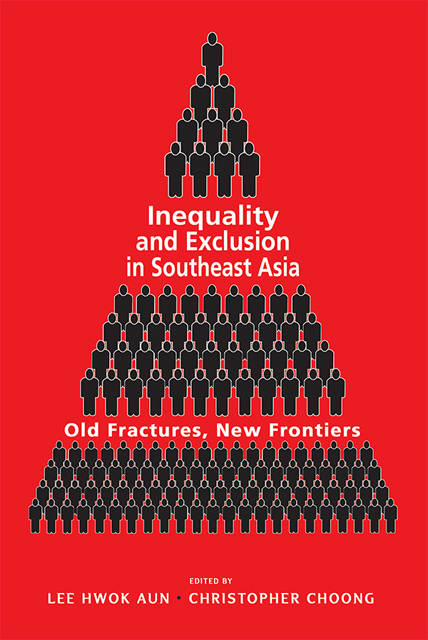Book contents
- Frontmatter
- Contents
- List of Tables
- List of Figures
- Acknowledgements
- About the Contributors
- 1 Introduction: Inequality and Exclusion in Southeast Asia
- 2 Cambodia’s Experiences in Addressing Inequality
- 3 Inequality and Exclusion in Post-Soeharto Indonesia
- 4 Inequality and Exclusion in Malaysia: Macro Trends, Labour Market Dynamics and Gender Dimensions
- 5 Inequality in Myanmar: Structural Change, Policy Outcomes and Gender Dimensions
- 6 Structural Inequality in the Philippines: Oligarchy, Economic Transformation and Current Challenges to Development
- 7 Inequality and the Social Compact in Singapore: Macro Trends vs Lived Inequalities
- 8 Inequality in Thailand: Income, Socio-economic and Wealth Dimensions
- 9 Trends and Drivers of Inequality in Vietnam
- 10 Conclusion: Old Fractures and New Frontiers
- Index
6 - Structural Inequality in the Philippines: Oligarchy, Economic Transformation and Current Challenges to Development
Published online by Cambridge University Press: 01 September 2023
- Frontmatter
- Contents
- List of Tables
- List of Figures
- Acknowledgements
- About the Contributors
- 1 Introduction: Inequality and Exclusion in Southeast Asia
- 2 Cambodia’s Experiences in Addressing Inequality
- 3 Inequality and Exclusion in Post-Soeharto Indonesia
- 4 Inequality and Exclusion in Malaysia: Macro Trends, Labour Market Dynamics and Gender Dimensions
- 5 Inequality in Myanmar: Structural Change, Policy Outcomes and Gender Dimensions
- 6 Structural Inequality in the Philippines: Oligarchy, Economic Transformation and Current Challenges to Development
- 7 Inequality and the Social Compact in Singapore: Macro Trends vs Lived Inequalities
- 8 Inequality in Thailand: Income, Socio-economic and Wealth Dimensions
- 9 Trends and Drivers of Inequality in Vietnam
- 10 Conclusion: Old Fractures and New Frontiers
- Index
Summary
INTRODUCTION
The recent performance of the Philippine economy poses a number of conundrums for analysts of growth and development. Regarded as the “sick man of Asia” since its mid-1980s debt crisis (Balisacan 2015), the country’s economic prospects until onset of the global COVID-19 pandemic have dramatically improved over the past decade, catapulting the economy to the ranks of Asia’s leading growth performers, and onto several lists of promising emerging economies such as Goldman Sachs’s “Next-Eleven”, Turner Investment Partners’ “TIMPs” (Turkey, Indonesia, Malaysia, Philippines), and Time magazine’s “PINEs” (Philippines, Indonesia, Nigeria, and Ethiopia). Nevertheless, parallel to this economic resurgence, deep-seated challenges of structural poverty and marginalization have persisted, with the country’s record in reducing poverty and inequality, generating quality employment, and promoting social mobility, having been disappointing. More troublingly, there is growing evidence that wealth inequality has risen, even while the social mobility prospects of most of the population have been hampered by entrenched forms of social and economic insecurity. These, in turn, have elicited concern from observers about the “exclusive” and even “oligarchic” character of the Philippine economy, which have yet to be decisively tackled by policymakers and the country’s political leadership (Habito 2012; Teehankee 2017).
Underlying these dynamics are political and economic systems that in the case of the Philippines have undergone extended transformations over the past few decades. In line with growing concern on rising domestic inequalities as well as entrenched obstacles towards achieving inclusive growth (Albert, Dumagan and Martinez 2015; Albert and Raymundo 2015), this chapter aims to situate inequality trends in the country amidst transformations in the Philippines’ political economy since the return to democracy in the mid-1980s—focusing on the contribution of structural and institutional change on the distribution of wealth and incomes, as well as social mobility. Starting with an overview of these transformations in the next section, we survey more specific trends in inequality and exclusion, and examine the factors that have driven such processes. In so doing, we stress the underlying political economy constraints that have impeded significant advances in the Philippines’ efforts to address inequality and exclusion, and attest to how incoherencies in the country’s response to the COVID-19 pandemic are linked to these structural issues.
- Type
- Chapter
- Information
- Inequality and Exclusion in Southeast AsiaOld Fractures, New Frontiers, pp. 169 - 217Publisher: ISEAS–Yusof Ishak InstituteFirst published in: 2023



